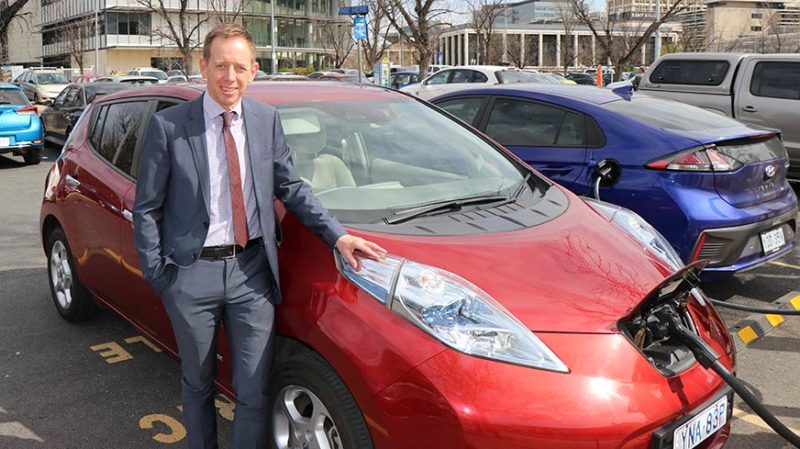The ACT has declared its intention to become the first Australian state or territory to put a ban on the sale of new petrol and diesel fuelled internal combustion engine (ICE) vehicles, flagging a cut-off date of 2035.
ACT minister for energy and emissions reduction, Shane Rattenbury, announced plans for a staged phase-out of petrol vehicles on Monday morning at a press conference, alongside a new “nation-leading” target for between 80-90% cent of new vehicle sales in the ACT to be zero-emission models by 2030.
The new transport decarbonisation strategy, more details of which will be revealed on Wednesday, will form a key new plank of the capital Territory’s goal to reach net-zero emissions by 2045 – five years ahead of most of the rest of the country.
Rattenburg said the ICE vehicle ban would initially apply to new light vehicles including passenger cars, motorcycles and small commercial trucks and – much like coal plant closure dates in other states – was being flagged now to give the industry time to adjust.
“We’re signaling right now goals for 2030 and 2035,” Rattenbury told reporters.
“We’re not springing a surprise on Canberrans, we’re being really clear about what the long-term direction is, wanting to give people plenty of time to get ready, plenty of time to make decisions and plenty of time to make sure the industry is supporting that changeover.”
“With more than 60% of our emissions coming from transport this is a key area for the ACT government to work with the community, with the business sector, and with the car makers to make sure that we are addressing this.
“Ninety-five per cent of vehicles in the ACT are light vehicles – this target is all about light vehicles,” Rattenbury added.
“There are [electric] models available right now that you can replace them with. And we expect more models to become available in the coming years.”
Already, the ACT has a number of incentives to drive the uptake of EVs, including a stamp duty waiver, two years’ free vehicle registration, and – for eligible households – access up to $15,000 towards the cost of an EV under the Sustainable Household Scheme zero interest loans.
On the other side of the equation, however, a firm date prohibiting the sale of new fossil fuel powered cars sends a crystal clear message to the auto industry – as well as to infrastructure providers – that electric vehicles are the way forward.
Cut-off dates for the sale of new ICE cars are not uncommon outside of Australia. Just a matter of weeks ago EU member states agreed to a 2035 combustion engine ban – and it was signed off by the EU Council – with a view to assess in 2026 whether carbon-neutral fuels could also be allowed.
But in Australia, the shift to EVs and the policy driving it has taken distinctly a slowly-slowly approach, with a complete lack of supporting policy at the national level under the previous Coalition government and mixed messages from some of the states.
“One of our biggest problems at the moment is that car makers look at Australia and see it as a backwater,” said Rattenbury.
“They don’t want to send vehicles here because the [previous federal] government’s been campaigning against them.
“And so if we can actually have a more friendly environment, I expect to start to see more vehicles coming to Australia which will … give consumers better choices, bring the prices down and make sure there’s more models available.”
Taking its lead from the former federal Coalition government, Australia’s automotive industry has also been dragging its feet on change, if not actively opposing any signs of ambitious policy to drive the shift to EVs.
“We have serious concerns that this policy will have adverse consequences for the automotive industry, the people they employ and consumers in the ACT,” said the CEO of the Australian Automotive Dealer Association, James Voortman, in a statement on Monday.
“Electric vehicles are currently more expensive and at present there is a distinct lack of choice in available makes and models. These factors may well change by 2035, but this ban has been foreshadowed in an environment where there is great uncertainty.
“The big risk is that people hold onto their older, more polluting cars for longer which will do nothing for reducing emissions,” Voorman added, noting that it was also unclear how the government would enforce a ban, particularly given the ACTs shared state borders.
The nuts and bolts of how the ICE vehicle ban will be enforced by the government are yet to be revealed, but Rattenbury on Monday sought to stress that owners of existing ICE vehicles would not be banned from driving ACT roads, come 2035.
“Many people will be replacing their vehicles over the next 10 years, so part of what we want to do with this strategy is signal to people where things are going, so they can make those longer term decisions.
“But for someone who still has their car in 2035, and they’re not up for a new one just yet, you’ll be able to keep driving your petrol vehicle at that point.
“We’re not going to take vehicles off the road, but what we want to do is stop new petrol vehicles coming into the system to stop the problem getting worse, and then we can focus on transitioning those older vehicles out.”

Sophie is editor of One Step Off The Grid and deputy editor of its sister site, Renew Economy. Sophie has been writing about clean energy for more than a decade.

